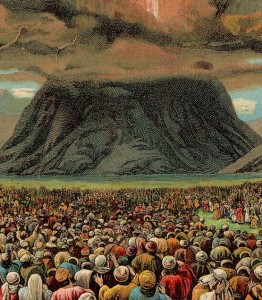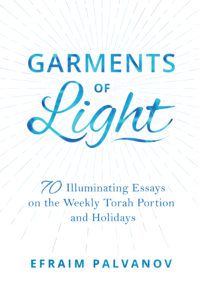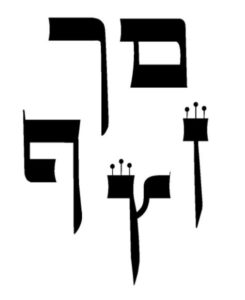This week’s very powerful Torah portion is Va’etchanan. In it, Moses continues his farewell speech to the nation before his death. Among other important points, he recaps the Ten Commandments, and proclaims the text of the Shema. Included in this speech are a number of significant prophecies and statements.
Moses reminds the people that what they witnessed at Mt. Sinai was a totally unique, once-in-history event, where God brought forth a divine revelation to the entire nation, with every single individual experiencing a prophetic vision. Moses tells us to always remember that this has never happened elsewhere in history (Deuteronomy 4:32-34). Although modern Biblical critics will immediately point out that there is no proof that such a national revelation ever took place, Moses tells us that no other people has ever even claimed such a thing! To this day, there is no nation or religion that claims to have started with a national revelation. Strangely, only the Jewish people make such a claim.

A 1907 Illustration of the National Revelation at Sinai
(Although some point out that the Aztecs seem to have a similar story of their god guiding them through a Wilderness to their very own promised land in Mexico, most modern scholars agree that this myth is very recent, adopted from the Jewish story in the Torah. The Aztecs picked it up from Christian missionaries and made it their own.)
Another prophecy in this week’s portion is that the Jewish people will be scattered around the world, and will always remain small in number (4:27). Three thousand years later, the prophecy still holds true, with just 0.2% of the world’s population being Jewish. That’s quite amazing, as it defies normal growth patterns. There are roughly two billion Christians in the world, and their religion emerged over a thousand years after Judaism. The number of Muslims is also steadily nearing two billion, and they came around even later, roughly 1400 years ago. Hindus, Buddhists, Sikhs, and virtually all other major religions outnumber the Jews. Even the Bahai faith, which started just 160 years ago is quickly catching up, and will soon outnumber Judaism, too.
Moses suggests that it is precisely because we are small in number that God chose us (7:7). Perhaps this can be explained with simple economics of supply and demand. The more of something that there is, the less value it is perceived to have. (Note the word perceived; all human life is of course equal.) The sworn enemies of the Jews seem to agree: Hamas thought it was totally fair to demand 1000 Palestinians to be freed in exchange for one Jew – Gilad Shalit!
The big question is: why did God “choose” us?
The Chosen People
To understand why God chose the Jewish people, and what exactly we are chosen for, one must look back to the beginning of the whole story. Originally, there were no Jews and no Torah. There were only Adam and Eve, in a perfect world, living with God’s revealed presence. The problem of this “perfect” world was that Adam and Eve were essentially unable to truly enjoy it. Having never experienced anything “bad”, they had no concept of what is “good” either. Life was just bland.
In the middle of Eden, God placed the Tree of Knowledge of Good and Evil. By consuming of its fruit, Adam and Eve would be introduced to these new concepts. They would now have to experience hardship and confront evil, but measure for measure, they would now also be able to enjoy goodness and pleasure. After all, it is only because we have had negative experiences that we can truly understand, appreciate, and strive for the positive ones.
Adam and Eve had a choice. They chose the Tree of Knowledge. With that, their perfect world was over. However, this was only temporary. God’s intention was for mankind to live in a world of goodness, not one of suffering. Yet, in order to make the most of the Garden of Eden, mankind first had to experience evil, overcome it, and transcend it. Ever since Adam and Eve were banished from the Garden, their mission has been to remove evil from their midst, restore goodness, and finally return to that Garden.
Adam and Eve were unable to do this, and neither were their children, or grandchildren. As humans multiplied, they only become more and more sinful, pushing themselves further away from Godliness and goodness. After ten generations, God hit the “restart” button to try again with Noah. Noah ultimately failed as well, and once more each passing generation only fell further into immorality. It took another ten generations before things started to change.
Abraham’s Revolution
Abraham was the first person to properly recognize what the universe was all about. He understood that the current state of the world was wrong. Life was never meant to be this way. Abraham thus made it his life’s mission to repair the world. He travelled across the Middle East and spread monotheism, righteousness, and Godliness wherever he went. Abraham embodied all of the traits necessary to restore the world to a state of Eden. And so, it wasn’t so much that God chose Abraham, but rather, that Abraham chose God.
To complete the task of repairing the world would require more than just one man. This huge mission would require a nation. Thankfully, Abraham’s son Isaac continued in his father’s path, as did Jacob the grandson, and his own twelve sons. From these twelve sons an entire nation was born – a nation whose mission would be to restore the world to the Garden of Eden.
History shows that the Jewish people have indeed done so. The Jews’ moral contributions to the world have been vast, and described in books like Ken Spiro’s WorldPerfect – The Jewish Impact on Civilization and Thomas Cahill’s The Gifts of the Jews, among others. The Jews’ contributions to science, medicine, and technology may be even greater. Some of the most important minds behind breakthroughs like the personal computer and the internet, the cellphone and lasers, vaccines and automobiles were Jews, as were some of the greatest figures in biology, chemistry, mathematics, and physics. It is also important not to forget the immeasurable spiritual contributions of the Jews to the world.
Of course, Jews are not perfect. The Torah itself attests to this many times, even in this week’s parasha that admonishes the nation on multiple occasions. At the end of the day, the name of our nation is Israel, which literally translates as “struggles with God.” Our history has been a difficult one, full of struggles and challenges. It is clear, though, that we are nearing the end of this period, and we will soon see the restoration of the Garden of Eden, as God originally intended.
The article above is adapted from Garments of Light – 70 Illuminating Essays on the Weekly Torah Portion and Holidays. Click here to get the book!

 In this week’s parasha, Beha’alotcha, we read how a year had passed since the Israelites had left Egypt, and God was now reminding the nation to commemorate Pesach. However, some people were spiritually impure at Pesach time because they had handled a corpse and were unable to take part in the Paschal offering. They approached Moses and asked “why should we be excluded so as not to bring the offering of the Lord in its appointed time, with all the children of Israel?” (Numbers 9:7) Moses was not sure how to answer them, so he took the case up to God, after which God told Moses about Pesach Sheni, the “second Passover” that could be done a month later in Iyar for those who had missed Passover in Nisan.
In this week’s parasha, Beha’alotcha, we read how a year had passed since the Israelites had left Egypt, and God was now reminding the nation to commemorate Pesach. However, some people were spiritually impure at Pesach time because they had handled a corpse and were unable to take part in the Paschal offering. They approached Moses and asked “why should we be excluded so as not to bring the offering of the Lord in its appointed time, with all the children of Israel?” (Numbers 9:7) Moses was not sure how to answer them, so he took the case up to God, after which God told Moses about Pesach Sheni, the “second Passover” that could be done a month later in Iyar for those who had missed Passover in Nisan.

